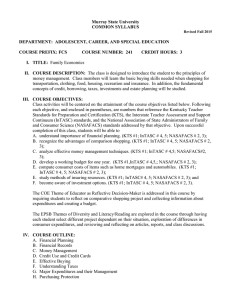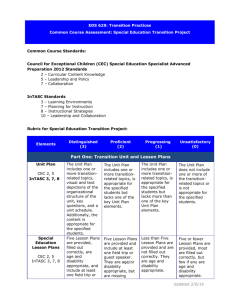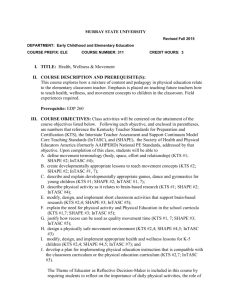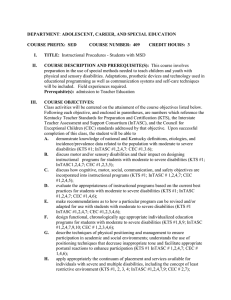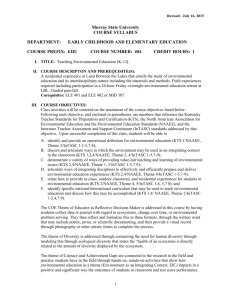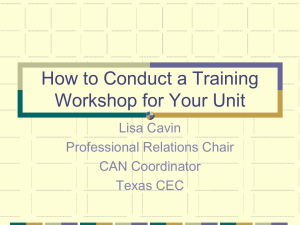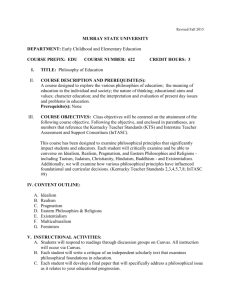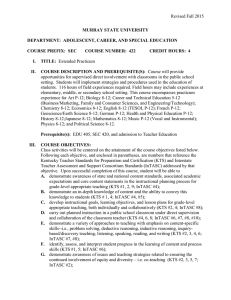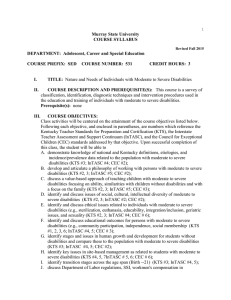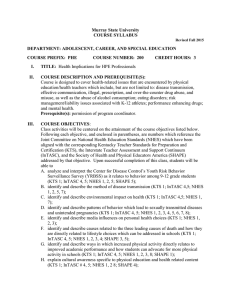MURRAY STATE UNIVERSITY
advertisement
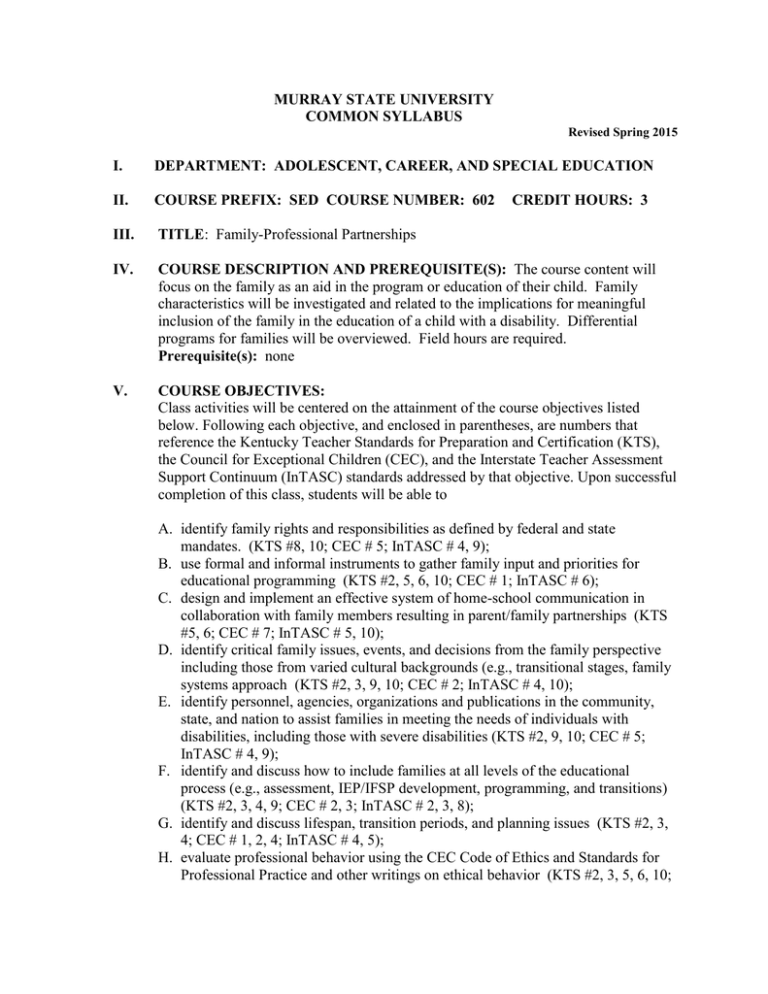
MURRAY STATE UNIVERSITY COMMON SYLLABUS Revised Spring 2015 I. DEPARTMENT: ADOLESCENT, CAREER, AND SPECIAL EDUCATION II. COURSE PREFIX: SED COURSE NUMBER: 602 III. TITLE: Family-Professional Partnerships IV. COURSE DESCRIPTION AND PREREQUISITE(S): The course content will focus on the family as an aid in the program or education of their child. Family characteristics will be investigated and related to the implications for meaningful inclusion of the family in the education of a child with a disability. Differential programs for families will be overviewed. Field hours are required. Prerequisite(s): none V. COURSE OBJECTIVES: Class activities will be centered on the attainment of the course objectives listed below. Following each objective, and enclosed in parentheses, are numbers that reference the Kentucky Teacher Standards for Preparation and Certification (KTS), the Council for Exceptional Children (CEC), and the Interstate Teacher Assessment Support Continuum (InTASC) standards addressed by that objective. Upon successful completion of this class, students will be able to CREDIT HOURS: 3 A. identify family rights and responsibilities as defined by federal and state mandates. (KTS #8, 10; CEC # 5; InTASC # 4, 9); B. use formal and informal instruments to gather family input and priorities for educational programming (KTS #2, 5, 6, 10; CEC # 1; InTASC # 6); C. design and implement an effective system of home-school communication in collaboration with family members resulting in parent/family partnerships (KTS #5, 6; CEC # 7; InTASC # 5, 10); D. identify critical family issues, events, and decisions from the family perspective including those from varied cultural backgrounds (e.g., transitional stages, family systems approach (KTS #2, 3, 9, 10; CEC # 2; InTASC # 4, 10); E. identify personnel, agencies, organizations and publications in the community, state, and nation to assist families in meeting the needs of individuals with disabilities, including those with severe disabilities (KTS #2, 9, 10; CEC # 5; InTASC # 4, 9); F. identify and discuss how to include families at all levels of the educational process (e.g., assessment, IEP/IFSP development, programming, and transitions) (KTS #2, 3, 4, 9; CEC # 2, 3; InTASC # 2, 3, 8); G. identify and discuss lifespan, transition periods, and planning issues (KTS #2, 3, 4; CEC # 1, 2, 4; InTASC # 4, 5); H. evaluate professional behavior using the CEC Code of Ethics and Standards for Professional Practice and other writings on ethical behavior (KTS #2, 3, 5, 6, 10; CEC # 6; InTASC # 9); I. demonstrate communication of rights to students with disabilities and their families (KTS #8, 10; CEC # 7; InTASC # 8, 10); and J. identify strategies for empowerment, advocacy, and building reliable alliances in school and community settings (KTS # 8; CEC # 6, 7; InTASC # 5, 8). The COE Theme of Educator as Reflective Decision Maker is addressed through assignments requiring students to discuss and reflect on collaboration and partnership with parents family members, personnel, agencies, and organizations. The EPSB Themes of Diversity and Closing the Achievement Gap are explored through various chapters within the text and more specifically in topics such as Family Characteristics, Roles of Families, Cultural Backgrounds in Families, Family as Partners in Assessing the Student with Disabilities, and Supporting Student Achievement and Performance. VI. CONTENT OUTLINE: A. Historical and Current Roles of Families and Parents B. Schools as Systems: The Context for Family-Professional Collaboration C. Empowerment and Building Reliable Alliances D. Understanding Families: Characteristics, Interaction, Functions, and Life Cycles E. Collaborating for Empowerment VII. INSTRUCTIONAL ACTIVITIES: The class format will be web based. Lessons will be on the Canvas site. VIII. FIELD, CLINICAL, AND/OR LABORATORY EXPERIENCES: Each student will conduct a family-focused interview with a family who has a child with a disability. The instructor will provide the interview format. This must be a face-to-face interview with as many of the immediate family members present as possible. This is an assignment that is to be conducted by the individual student and not as a joint interview with other university students in attendance. No audio or video taping of this assignment is permitted. Submit a written permission form signed by the family members with the assignment. IX. TEXT(S) AND RESOURCES: Turnbull, A. P., Turnbull, H. R., Erwin, E. and Soodak, L., Shogren, K.A. (2015). Families, professionals, and exceptionality: Positive Outcomes Through Partnerships and Trust. (7th ed.). Upper Saddle River, NJ: Merrill. Internet X. EVALUATION AND GRADING PROCEDURES: The grading scale below will be used to determine the final grade for the course: A = 93 - 100% B = 86 - 92% C = 79 - 85% D = 72 - 78% E = 0 - 71% Each item is worth the following points of your final grade : Resource File Assignment: 100 *Family Focused Interview: 100 Midterm and Final Exam: 50 each (total 100) Quizzes (2): 25 each (total 50) Discussion Board (12): 5 each (total 60) Total = 410 XI. ATTENDANCE POLICY: Students are expected to adhere to the MSU Attendance Policy outlined in the current MSU Bulletin. XII. ACADEMIC HONESTY POLICY: Murray State University takes seriously its moral and educational obligation to maintain high standards of academic honesty and ethical behavior. Instructors are expected to evaluate students’ academic achievements accurately, as well as ascertain that work submitted by students is authentic and the result of their own efforts, and consistent with established academic standards. Students are obligated to respect and abide by the basic standards of personal and professional integrity. Violations of Academic Honesty include: Cheating - Intentionally using or attempting to use unauthorized information such as books, notes, study aids, or other electronic, online, or digital devices in any academic exercise; as well as unauthorized communication of information by any means to or from others during any academic exercise. Fabrication and Falsification - Intentional alteration or invention of any information or citation in an academic exercise. Falsification involves changing information whereas fabrication involves inventing or counterfeiting information. Multiple Submission - The submission of substantial portions of the same academic work, including oral reports, for credit more than once without authorization from the instructor. Plagiarism - Intentionally or knowingly representing the words, ideas, creative work, or data of someone else as one’s own in any academic exercise, without due and proper acknowledgement. Instructors should outline their expectations that may go beyond the scope of this policy at the beginning of each course and identify such expectations and restrictions in the course syllabus. When an instructor receives evidence, either directly or indirectly, of academic dishonesty, he or she should investigate the instance. The faculty member should then take appropriate disciplinary action. Disciplinary action may include, but is not limited to the following: 1) Requiring the student(s) to repeat the exercise or do additional related exercise(s). 2) Lowering the grade or failing the student(s) on the particular exercise(s) involved. 3) Lowering the grade or failing the student(s) in the course. If the disciplinary action results in the awarding of a grade of E in the course, the student(s) may not drop the course. Faculty reserve the right to invalidate any exercise or other evaluative measures if substantial evidence exists that the integrity of the exercise has been compromised. Faculty also reserve the right to document in the course syllabi further academic honesty policy elements related to the individual disciplines. A student may appeal the decision of the faculty member with the department chair in writing within five working days. Note: If, at any point in this process, the student alleges that actions have taken place that may be in violation of the Murray State University Non-Discrimination Statement, this process must be suspended and the matter be directed to the Office of Institutional Diversity, Equity and Access. Any appeal will be forwarded to the appropriate university committee as determined by the Provost. XIII. NON-DISCRIMINATION POLICY AND STUDENTS WITH DISABILITIES: Policy Statement Murray State University endorses the intent of all federal and state laws created to prohibit discrimination. Murray State University does not discriminate on the basis of race, color, national origin, gender, sexual orientation, religion, age, veteran status, or disability in employment, admissions, or the provision of services and provides, upon request, reasonable accommodation including auxiliary aids and services necessary to afford individuals with disabilities equal access to participate in all programs and activities. For more information, contact the Executive Director of Institutional Diversity, Equity and Access, 103 Wells Hall, (270) 809-3155 (voice), (270) 809-3361 (TDD). Students with Disabilities Students requiring special assistance due to a disability should visit the Office of Student Disability Services immediately for assistance with accommodations. For more information, students should contact the Office of Student Disability Services, 423 Wells Hall, Murray, KY 42071. 270-809-2018 (voice) 270-809-5889(TDD).
